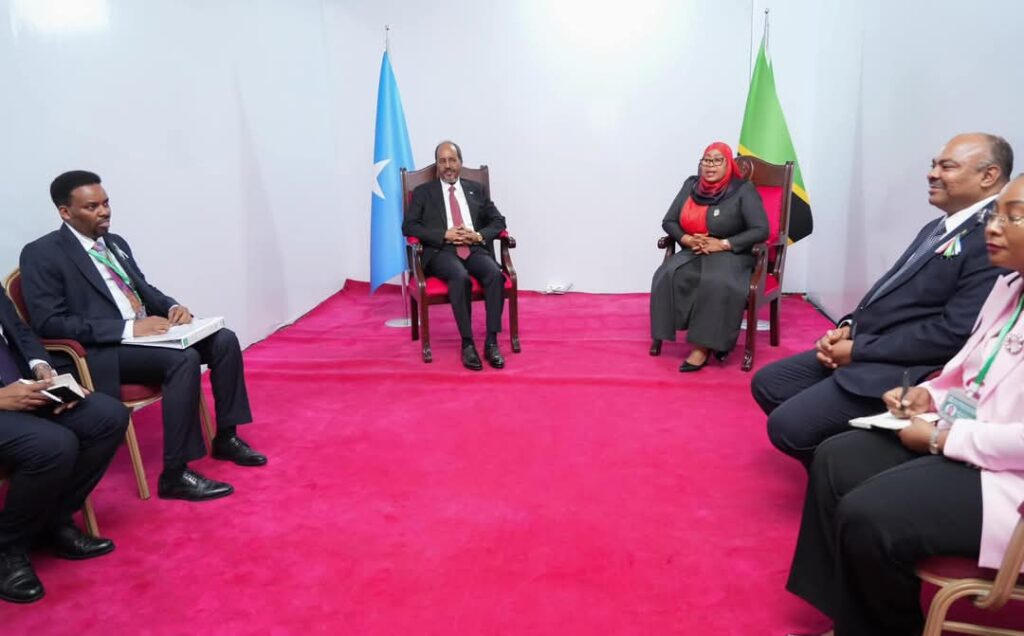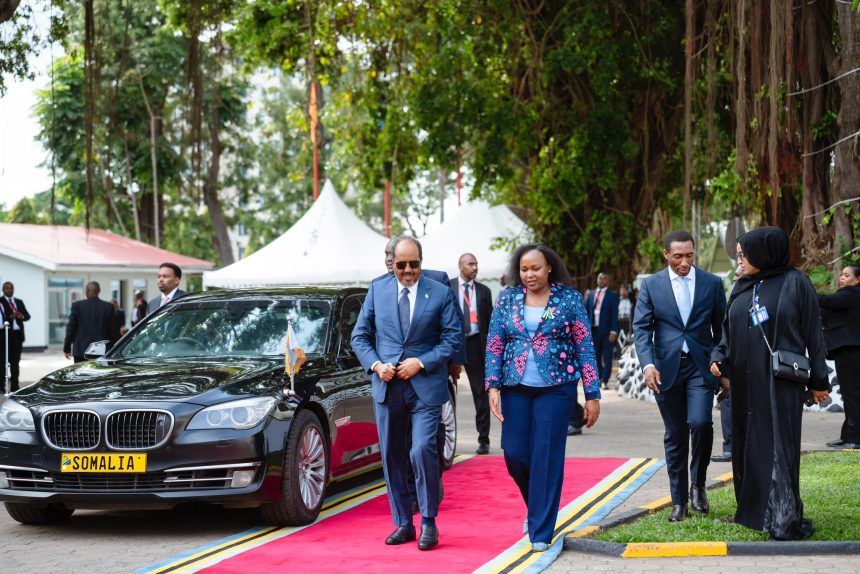Article by Abdiqani Abdullahi Ahmed
Mogadishu, SONNA: Somalia recently made its debut at the East African Community (EAC) Heads of State Summit. This historic event marks Somalia’s official integration into the EAC, a regional intergovernmental organization dedicated to the economic, political, and social prosperity of its member states. The 24th Ordinary Summit of the EAC Heads of State, held in Arusha, was a momentous occasion for Somalia, with President Hassan Sheikh delivering an inspiring speech and holding important sideline meetings with other heads of state.
Somalia’s journey to becoming a member of the EAC has been a story of resilience and determination. Historically, Somalia has faced numerous challenges, including civil conflict and political instability, which have hindered its ability to participate fully in regional initiatives. However, in recent years, Somalia has made significant strides towards stability and development, paving the way for its acceptance into the EAC.
The formal process of joining the EAC began with Somalia expressing its interest in membership several years ago. This interest was driven by the recognition of the economic and social benefits that come with being part of a larger regional bloc. In August of this year, after rigorous assessments and discussions, Somalia was officially admitted as the 8th member state of the EAC.
This integration into the EAC represents a new chapter for Somalia, promising enhanced cooperation in trade, infrastructure, and socio-economic development. The historical significance of this move cannot be understated, as it reflects Somalia’s commitment to regional integration and its aspirations for a brighter, more connected future.
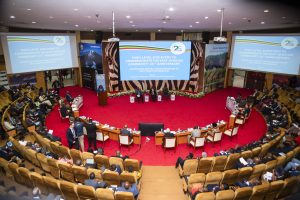
Significance of EAC Membership for Somalia
Somalia’s accession to the East African Community (EAC) is a significant milestone that holds immense promise for the country’s economic, social, and political landscape. As a full-fledged member of the EAC, Somalia stands to benefit from enhanced regional cooperation, which can potentially accelerate its development and integration into the global economy.
Economic Benefits: Joining the EAC opens new avenues for Somalia to tap into a larger market, facilitating trade and investment opportunities. The harmonization of policies and regulations within the EAC framework will allow Somalia to benefit from collective bargaining power, attracting foreign direct investment and boosting local industries. Additionally, the elimination of trade barriers and the establishment of a common market will enable Somali businesses to expand their reach, fostering economic growth and job creation.
Social and Political Advantages: On the social front, EAC membership offers Somalia the opportunity to participate in various regional initiatives aimed at improving education, healthcare, and infrastructure. Collaborative efforts in these areas will enhance the quality of life for the Somali people, promoting social cohesion and stability. Politically, Somalia’s inclusion in the EAC strengthens its position in regional diplomacy, allowing it to contribute to and benefit from collective security and governance frameworks. This integration also reflects a broader commitment to peace and stability in the region, reinforcing Somalia’s role as a proactive partner in East African affairs.
Challenges and Opportunities: While the benefits are substantial, Somalia’s integration into the EAC also presents certain challenges. The country will need to align its policies and institutions with EAC standards, which may require significant reforms and capacity-building efforts. However, these challenges are accompanied by opportunities for growth and development. By leveraging the support and expertise of EAC member states, Somalia can navigate these challenges effectively, positioning itself as a key player in the regional bloc.
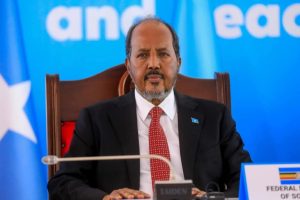
President Hassan Sheikh’s Speech
At the 24th Ordinary Summit of the EAC Heads of State, President Hassan Sheikh’s speech was a highlight, encapsulating the aspirations and commitments of Somalia as it joins the regional bloc. The President’s address focused on several key themes, reflecting Somalia’s vision for its role within the EAC.
President Hassan Sheikh began his speech by commending the EAC for its achievements in fostering regional cooperation and development over the past 25 years. He highlighted the importance of unity and collaboration in addressing common challenges and achieving shared goals.
A significant portion of the President’s speech was dedicated to discussing Somalia’s alignment with the EAC Vision 2050. He emphasized Somalia’s commitment to contributing to the regional bloc’s socio-economic, trade, and social integration agenda. By aligning its national development plans with the EAC’s long-term vision, Somalia aims to play an active role in advancing the region’s collective progress.
The President reiterated Somalia’s dedication to promoting development and security within the EAC. He pledged Somalia’s support for initiatives aimed at enhancing economic resilience, advancing technological innovation, and fostering peace and stability. The President’s speech also pointed out Somalia’s readiness to collaborate with EAC member states on critical issues such as taxation, technology, and regional security.
President Hassan Sheikh’s compelling address at the summit not only marked Somalia’s formal entry into the EAC but also set the tone for its active and constructive participation in the regional bloc’s future endeavors.

Cultural Showcase
Somalia’s participation in the East African Community (EAC) Heads of State Summit was not only marked by political and economic discussions but also by a vibrant display of Somali culture. The cultural showcase was a significant aspect of the event, highlighting the rich heritage and artistic traditions of Somalia, and fostering a sense of unity and mutual respect among the EAC member states.
The event featured an array of traditional Somali performances, including music, dance, and poetry. These performances provided a glimpse into Somalia’s rich cultural tapestry, showcasing the country’s unique artistic expressions. Traditional Somali music, characterized by its distinctive beats and melodies, resonated through the venue, capturing the hearts of attendees. Dancers, adorned in colorful attire, performed traditional routines that depicted various aspects of Somali life, from pastoralist traditions to coastal influences.
In addition to performances, the cultural showcase included exhibitions of Somali art and crafts. Intricately woven baskets, pottery, and traditional textiles were displayed, highlighting the skilled craftsmanship of Somali artisans. These exhibitions not only celebrated the creativity and ingenuity of the Somali people but also served as a platform for cultural exchange, allowing other EAC members to appreciate the diversity and richness of Somali heritage.
The cultural showcase played a vital role in promoting regional unity and understanding. By sharing its cultural heritage, Somalia showed the importance of cultural exchange in building strong and cohesive communities within the EAC. The event provided a platform for mutual appreciation and respect, reinforcing the bonds between member states and celebrating the diversity that enriches the East African region.
Somalia’s cultural contribution to the summit was a vivid reminder of the power of culture in bridging differences and fostering a sense of shared identity. It highlighted the common threads that weave together the fabric of the East African Community, emphasizing the role of culture in promoting peace, harmony, and collective progress.
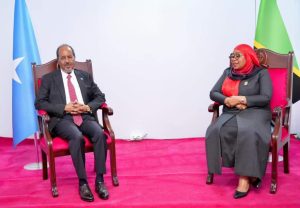
Bilateral Meetings
The 24th Ordinary Summit of the EAC Heads of State provided an invaluable opportunity for leaders to engage in bilateral meetings, fostering stronger ties and collaborations among member states. President Hassan Sheikh of Somalia made the most of this occasion by holding several key sideline meetings with his counterparts, reinforcing Somalia’s commitment to regional cooperation and integration.
One of the notable sideline meetings was between President Hassan Sheikh and President Samia Suluhu of Tanzania. This meeting focused on strengthening the bilateral relations between Somalia and Tanzania. The two leaders discussed various areas of mutual interest, including trade, security, and cultural exchange. President Hassan Sheikh emphasized the importance of collaboration in enhancing economic ties, particularly in sectors such as agriculture and fisheries, which are vital to both countries’ economies. The meeting also underscored the need for joint efforts in combating security challenges in the region, highlighting Somalia’s active role in promoting peace and stability within the EAC.
During the summit, President Hassan Sheikh engaged in discussions aimed at exploring new economic and trade opportunities within the EAC framework. These meetings with other heads of state focused on identifying areas where Somalia can contribute to and benefit from regional trade initiatives. The President advocated for the removal of trade barriers and the establishment of streamlined processes to facilitate the free movement of goods and services. By leveraging the EAC’s common market, Somalia aims to boost its exports and attract investment, thereby fostering economic growth and development.
Security was a prominent topic in the bilateral meetings, as the leaders recognized the importance of collective efforts in addressing regional security threats. President Hassan Sheikh reaffirmed Somalia’s commitment to working closely with EAC member states in combating terrorism, piracy, and other transnational crimes. Collaborative security measures and intelligence sharing were identified as crucial strategies in ensuring the safety and stability of the region. These discussions reflected a shared resolve to create a secure environment conducive to economic and social progress.
The bilateral meetings also highlighted the significance of cultural and social ties in fostering regional unity. President Hassan Sheikh and his counterparts discussed initiatives to promote cultural exchange programs, educational collaborations, and people-to-people connections. Such initiatives aim to deepen mutual understanding and respect among the diverse communities within the EAC, reinforcing the bonds that unite the member states.
President Hassan Sheikh’s proactive engagement in these bilateral meetings demonstrated Somalia’s readiness to play an active and constructive role in the EAC. By strengthening its relationships with other member states, Somalia is well-positioned to contribute to the region’s collective development.
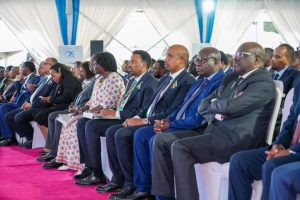
EAC Vision 2050
The East African Community (EAC) Vision 2050 is an ambitious roadmap aimed at transforming the region into a globally competitive and politically united economic bloc. As a newly inducted member of the EAC, Somalia is poised to contribute to and benefit from this long-term vision. The EAC Vision 2050 outlines a framework for sustainable development, focusing on key areas such as economic growth, social inclusion, and environmental sustainability.
President Hassan Sheikh, in his speech at the summit, emphasized Somalia’s commitment to aligning its national development plans with the EAC Vision 2050. This alignment involves adopting policies and strategies that support the region’s collective goals, such as improving infrastructure, enhancing trade facilitation, and fostering innovation. By integrating its efforts with the broader EAC agenda, Somalia aims to accelerate its own development while contributing to the region’s overall progress.
One of the core pillars of the EAC Vision 2050 is socio-economic development. For Somalia, this means leveraging the opportunities provided by EAC membership to improve the living standards of its citizens. The vision emphasizes the importance of creating a conducive environment for business and investment, which can drive economic growth and job creation. Somalia’s participation in regional initiatives, such as the common market and customs union, will facilitate access to larger markets and enhance trade opportunities, fostering economic resilience and sustainability.
Trade is a crucial component of the EAC Vision 2050, and Somalia’s strategic location along the Horn of Africa positions it as a key player in regional trade networks. By participating in the EAC’s efforts to eliminate trade barriers and harmonize regulations, Somalia can boost its exports and attract foreign direct investment. The vision also highlights the importance of developing infrastructure to improve connectivity, such as roads, railways, and ports, which are essential for facilitating the movement of goods and services across the region.
The EAC Vision 2050 places significant emphasis on innovation and digital transformation as drivers of sustainable development. Somalia’s integration into the EAC provides an opportunity to collaborate on technological advancements and leverage digital solutions to address development challenges. During the summit, discussions on the role of technology in the region emphasized the need for collective efforts to enhance digital connectivity and promote innovation. Somalia is committed to adopting and implementing technological solutions that can improve governance, service delivery, and economic productivity.
Sustainable development is a key aspect of the EAC Vision 2050, with a focus on balancing economic growth with environmental protection. Somalia’s commitment to environmental sustainability involves adopting practices that promote the responsible use of natural resources and mitigate the impacts of climate change. By collaborating with other EAC member states, Somalia can participate in regional efforts to address environmental challenges, such as deforestation, water scarcity, and biodiversity loss, ensuring a sustainable future for the region.
The EAC Vision 2050 provides a comprehensive framework for Somalia to achieve its development aspirations while contributing to the region’s collective progress. By aligning its efforts with the vision’s goals, Somalia is well-positioned to play an active and constructive role in shaping the future of the East African Community.
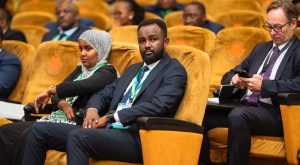
Role of Technology and Innovation
The 24th Ordinary Summit of the EAC Heads of State highlighted the critical role of technology and innovation in driving sustainable development across the region. For Somalia, integrating into the EAC’s technological and innovation ecosystem presents a myriad of opportunities to accelerate its development and enhance its global competitiveness.
As a new member of the EAC, Somalia is committed to embracing digital transformation to improve governance, service delivery, and economic productivity. The summit discussions emphasized the importance of leveraging digital technologies to address development challenges and promote inclusive growth. Somalia plans to collaborate with other EAC member states to enhance digital connectivity, develop robust digital infrastructure, and implement e-government initiatives. These efforts aim to streamline administrative processes, increase transparency, and facilitate the efficient delivery of public services.
The EAC Vision 2050 places a strong emphasis on fostering innovation and supporting startups. Somalia’s participation in regional innovation initiatives will enable it to tap into a larger pool of resources, knowledge, and expertise. By establishing innovation hubs and supporting entrepreneurial ecosystems, Somalia can nurture its growing tech community and promote the development of homegrown solutions. These initiatives will not only drive economic growth but also create employment opportunities for the youth, fostering a culture of innovation and creativity.
Technology and innovation are inherently collaborative, and Somalia’s integration into the EAC provides a platform for cross-border partnerships. By engaging in collaborative research and development projects with other EAC member states, Somalia can leverage collective expertise to solve common challenges. These collaborations can lead to the development of innovative solutions in areas such as agriculture, healthcare, and education, enhancing the quality of life for communities across the region.
Building a skilled workforce is essential for harnessing the full potential of technology and innovation. Somalia plans to invest in capacity building and skills development programs to equip its citizens with the necessary digital skills. By partnering with educational institutions and industry leaders within the EAC, Somalia aims to provide training and education that aligns with the demands of the digital economy. These efforts will empower individuals to participate in and contribute to the region’s technological advancements.

Future Prospects and Expectations
Somalia’s integration into the East African Community (EAC) heralds a future filled with promise and potential. As the newest member of the regional bloc, Somalia is poised to embark on a journey of transformation, leveraging the opportunities presented by EAC membership to achieve its development aspirations.
One of the primary benefits of EAC membership is the potential for economic growth and trade expansion. By participating in the EAC’s common market and customs union, Somalia can enhance its trade relationships, increase exports, and attract foreign investment. The removal of trade barriers and the establishment of a unified regulatory framework will facilitate the seamless movement of goods and services, boosting economic activity and creating jobs.
Infrastructure development is a key priority for the EAC Vision 2050, and Somalia stands to benefit significantly from regional initiatives aimed at improving connectivity. Investments in transport, energy, and communication infrastructure will enhance Somalia’s integration into regional and global value chains. Improved infrastructure will also support the growth of key sectors such as agriculture, manufacturing, and tourism, driving economic diversification and resilience.
EAC membership offers Somalia the opportunity to participate in regional programs focused on social and human development. Collaborative efforts in education, healthcare, and social protection will improve the quality of life for Somali citizens. By adopting best practices and learning from the experiences of other member states, Somalia can implement effective policies and programs that promote social inclusion, equity, and well-being.
Somalia’s commitment to regional security and stability is central to its engagement with the EAC. Collaborative security measures and intelligence sharing will enhance the region’s ability to address common threats such as terrorism, piracy, and transnational crimes. By working together, EAC member states can create a secure environment that supports economic growth and social development.
Sustainable development is a cornerstone of the EAC Vision 2050, and Somalia is dedicated to contributing to regional efforts to protect the environment. Initiatives focused on climate resilience, renewable energy, and natural resource management will promote sustainable development practices. By participating in these efforts, Somalia can ensure that its development trajectory is environmentally sustainable and resilient to the impacts of climate change.
Somalia’s integration into the EAC marks the beginning of a new chapter in its development journey. The country’s active participation in regional initiatives and commitment to the EAC’s vision will drive economic growth, enhance social and human development, and promote regional security and stability. As Somalia aligns its national priorities with the EAC Vision 2050, it is well-positioned to achieve its development goals and contribute to the collective progress of the East African Community.
